10 Signs You Need To Have Your Home Checked By An Electrician
An electrical inspection at home is a thorough evaluation of the electrical system.
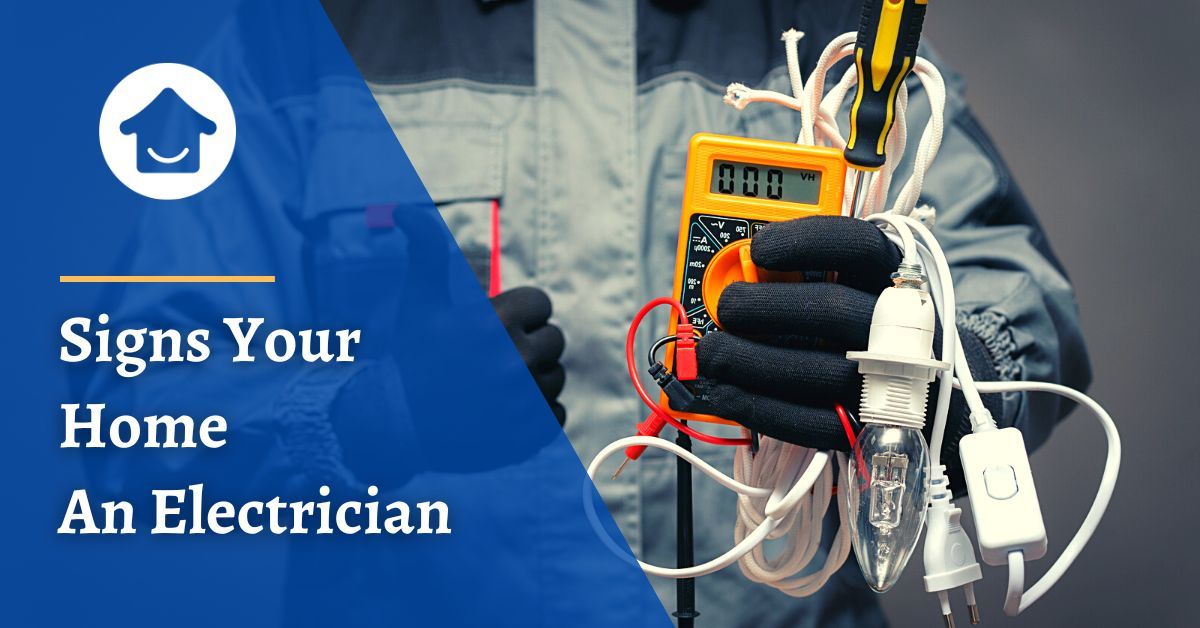
As electricity prices rise, it's a good idea to constantly inspect your home's electrical outlets, panel boxes, and the overall condition of your lighting systems. Electrical systems can deteriorate over time, and regular inspections can help identify potential hazards or issues before they become serious problems. But what is it, and when should you schedule an electrical inspection at home?
What Is An Electrical Inspection?
An electrical inspection at home is a thorough evaluation of the electrical system. It’s performed by a licensed electrician to identify potential hazards or code violations. The inspection involves examining the main service panel, circuit breakers, fuses, outlets, switches, and wiring to ensure that they function properly and are up to code. The electrician will also check for proper grounding, insulation, and protection against electrical shock.

It's recommended to have a licensed electrician inspect your electrical system. Reputable professionals, such as the electrician West Hartford team, are guaranteed to use the most appropriate tools for the job. They may use specialized equipment, such as multimeters or thermal imaging cameras, to detect any abnormalities in the electrical system. They may also test outlets and other devices to ensure they function correctly and safely.
After the inspection, the electrician will provide a detailed report of any issues found and recommendations for repairs or upgrades. This report can help homeowners address any potential hazards, increase the safety and efficiency of their electrical system, and ensure compliance with local electrical codes. Ultimately, regular electrical inspections can help prevent costly and dangerous electrical problems and give homeowners peace of mind that their electrical system is safe and reliable.
What Are The Signs You Need An Electrical Inspection?
Electrical problems can be hazardous and even deadly. Hence, it's vital to know the signs that you need an electrical inspection to address potential hazards before they become serious issues and ensure the safety of your home and family.
Below is a list of the most common signs you need an electrical inspection. If you notice any of these signs, it’s important to have your electrical system inspected by a licensed electrician to prevent any eventual hazards and ensure the safety and efficiency of your home's electrical system.
1. Flickering Or Dimming Lights
While this issue may be as simple as a loose light bulb or a problem with the fixture, it could also be a symptom of a more serious problem, such as overloaded circuits, faulty wiring, or other issues with your electrical system. In addition to being a nuisance, flickering or dimming lights can be a potential safety hazard, as they may indicate an electrical problem that could lead to fire or other damage.

If you experience flickering or dimming lights, it’s best to have a licensed electrician inspect your electrical system to identify the cause of the problem.
2. Buzzing Sounds From Switches And Outlets
Hearing buzzing sounds from outlets and frequent electric shocks isn’t normal and may indicate an electrical issue. It’s important to have a licensed electrician inspect the outlet to ensure it’s safe and functioning properly.
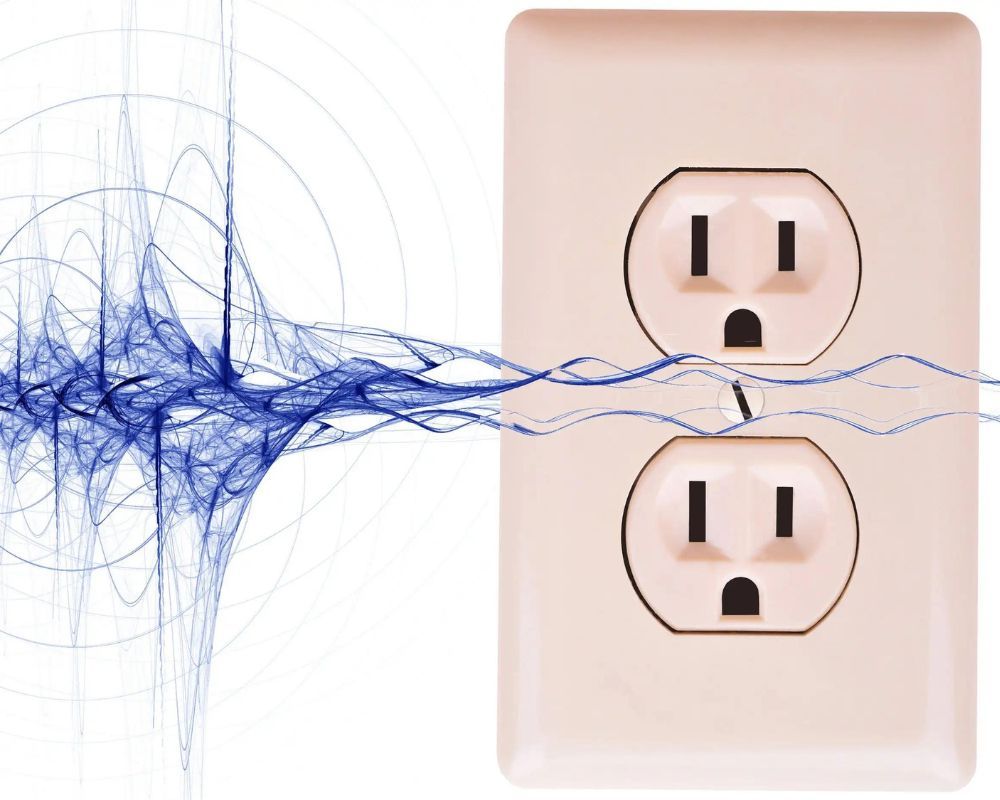
If you hear buzzing sounds from your outlets, you should turn off the circuit breaker and avoid using it until an electrician inspects it. This will avoid further risk.
3. Burning Smells
Burning smells and discolour outlets may indicate that the outlet or wiring is overheating and potentially melting or burning. If you think there are burning smells at your home, turn off the power to the affected area and stop using the outlet or switch. Don’t attempt to investigate or fix the problem yourself.
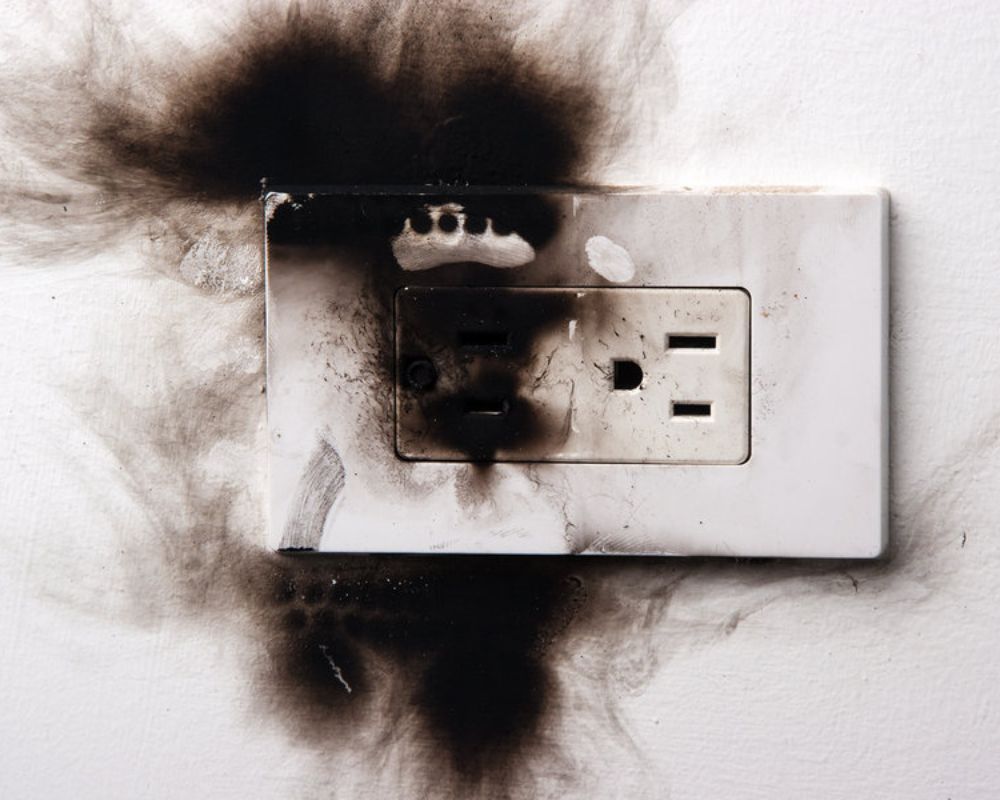
Rather, find a professional electrician to diagnose and repair the issue as soon as possible. Failure to take immediate action can lead to a potential electrical fire, which can cause serious damage to your home and endanger your safety.
4. Electrical Outlets Or Switches That Are Too Hot To Touch
Outlets and switches that are hot to the touch can indicate a potentially dangerous electrical problem. The most common cause of hot outlets and switches is an overloaded circuit, which occurs when too many electrical devices are connected to a single circuit. When a circuit is overloaded, it can overheat, causing outlets and switches to become hot to the touch.
Other potential causes of hot outlets and switches include loose or damaged wiring, a faulty switch or outlet, or a problem with the electrical panel or circuit breaker. If your outlets or switches feel hot when touched, immediately turn off power to the affected area and consult a licensed electrician to diagnose and fix the issue.
5. Old Or Outdated Electrical Panels Or Wiring
Old and outdated electrical panels and wiring can pose significant safety risks, particularly in older homes. Electrical panels and wiring can deteriorate over time, increasing the risk of electrical fires, electrocution, and other hazards.
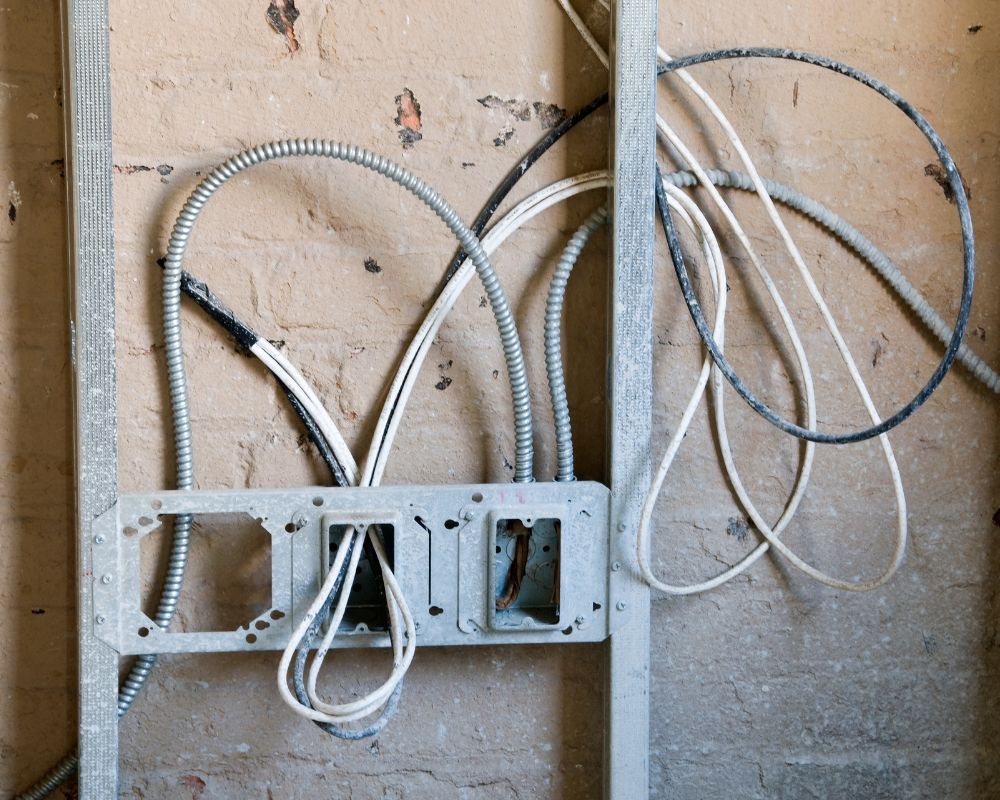
Suppose your home has an older electrical panel or wiring. In that case, it’s important to have it inspected by a licensed electrician to determine if it needs to be updated or replaced. Some signs that your electrical panel or wiring may be outdated or need repair include frequent power outages, tripping circuit breakers, flickering lights, or burning smells.
Upgrading your electrical system to meet modern safety standards can help protect your home and family from potential electrical hazards. It’s also often necessary to ensure compliance with local building codes and to qualify for home insurance coverage.
6. Use Of Extension Cords And Power Strips As Permanent Solutions
Extension cords and power strips aren’t designed as permanent electrical power solutions. They’re designed for temporary use, such as for plugging in an appliance or device in a location where there are no electrical outlets.
Using extension cords and power strips as permanent solutions can create a significant fire hazard, as they can easily become overloaded and overheat. Additionally, they can pose a tripping hazard if left in place for an extended period of time.
If you need additional electrical outlets in your home, it’s best to have a licensed electrician install additional outlets per local building codes. This will ensure that your home's electrical system is safe and up to code.
7. Appliances Or Devices That Frequently Overload Circuits
If most of your home appliances and devices are connected to overloaded circuits, you may experience the blowing of fuses or frequent tripping of circuit breakers, which can cause power outages and damage to your electrical system. Besides that, overloading circuits can also create a significant fire hazard, as it can cause wires and components to overheat and potentially melt or catch fire.
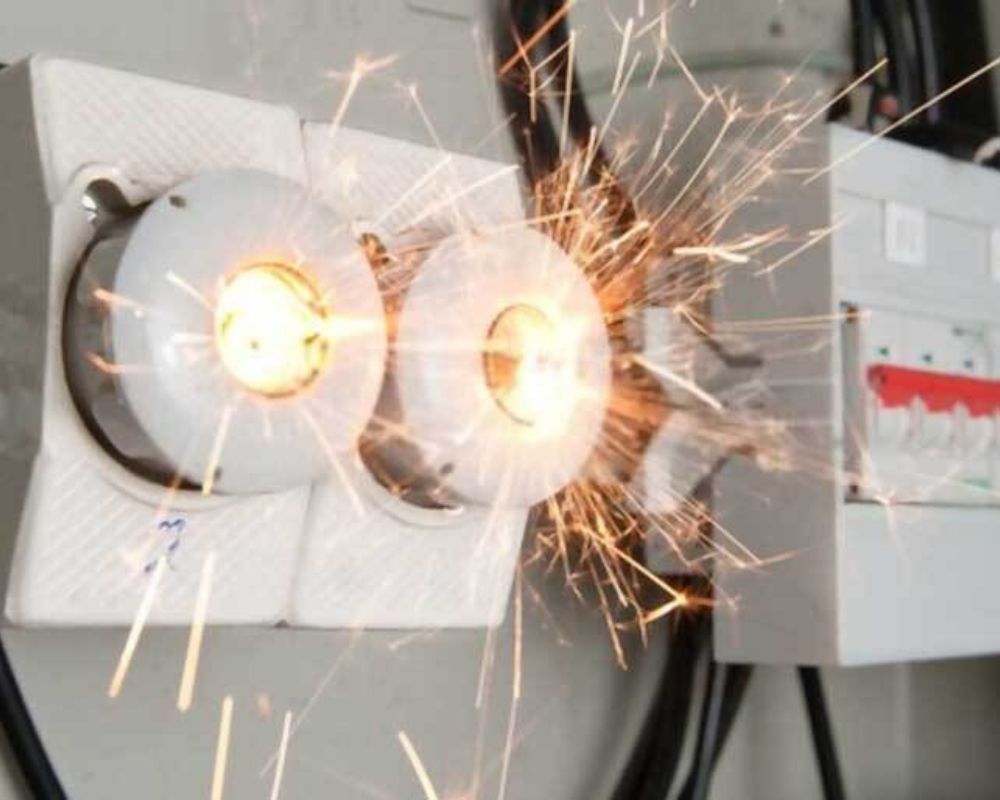
It’s important to distribute your electrical load evenly across multiple circuits to avoid overloading circuits. Consider having a licensed electrician evaluate your electrical system and make any necessary upgrades or modifications to ensure that it can safely and effectively meet your power needs. This may involve installing additional circuits, upgrading your electrical panel, or replacing outdated wiring or components.
8. Lack Of Ground Fault Circuit Interrupter (GFCI) Protection In High-risk Areas
GFCI protection is a critical safety feature designed to protect against electric shock and electrocution, particularly in locations with a high risk of electric shock or exposure to water. It works by shutting off power to a circuit if a fault is detected, such as a current flowing through a person's body.
If your home lacks GFCI protection in required areas, it’s important to have a licensed electrician install GFCI outlets or GFCI circuit breakers as soon as possible. Not having GFCI protection can create a serious safety hazard for you and your family and may also result in a violation of local electrical codes.
9. Sparks Coming From Outlets And Switches
Sparks can signify a serious electrical problem, and touching the outlet or switch can put you at risk of electrical shock. If you see sparks coming from your switches and outlets, contact a licensed electrician to inspect your electrical system and identify the cause of the sparking. Don't use the affected outlet or switch until the problem has been identified and repaired by a licensed electrician. This can help reduce the risk of further damage or a potential electrical fire.
10. Unexplained High Electricity Bills
There are a number of factors that may have caused a high electricity bill. But if you notice signs such as flickering or dimming lights, buzzing or humming sounds, or tripped circuit breakers, it might be because of faulty electrical wiring. In this case, it’s important to have a licensed electrician inspect your electrical system to identify and address any issues.
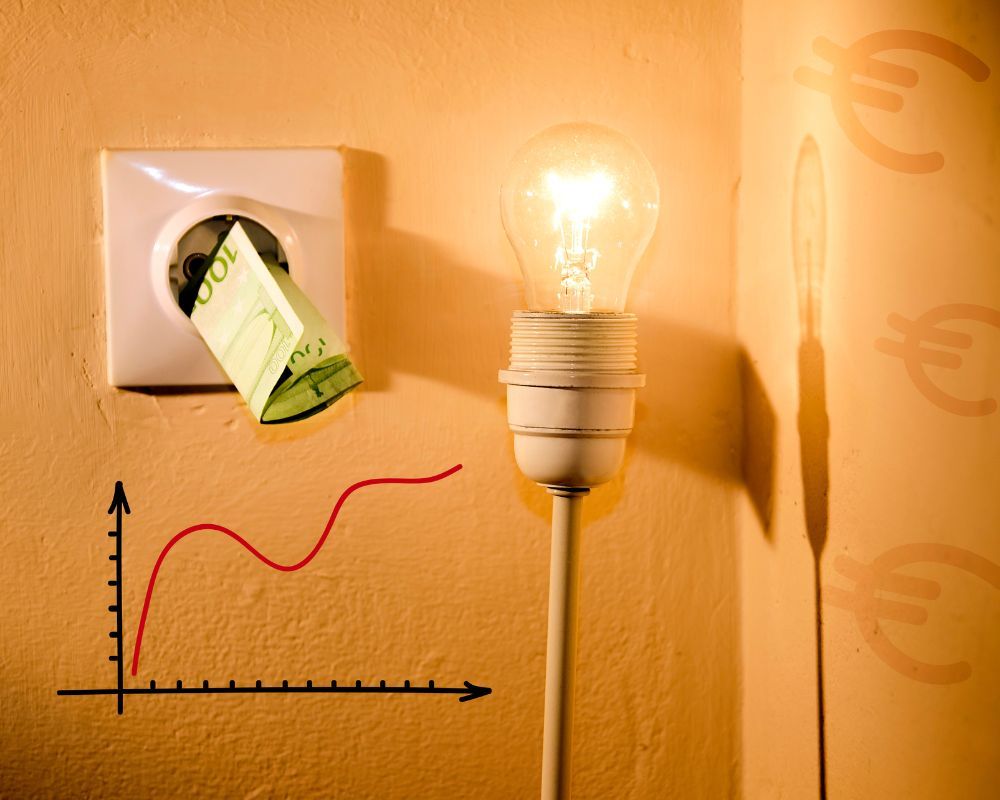
If you have ruled out other potential causes of high energy bills, it may be worth consulting an electrician to assess your electrical system for problems such as outdated wiring, overloaded circuits, or faulty appliances. By identifying and addressing the underlying cause of high energy consumption, you can take steps to reduce your electricity bills and save money over the long term.
The Bottom Line
Electrical hazards can be extremely dangerous, potentially causing electrical shocks, electrocution, and even fires. Knowing the signs of an electrical hazard can help you identify and address potential safety risks before they cause harm. Therefore, remember the signs of a possible electrical hazard to help keep you and your family safe, prevent property damage, ensure legal compliance, and save money.




Comments ()